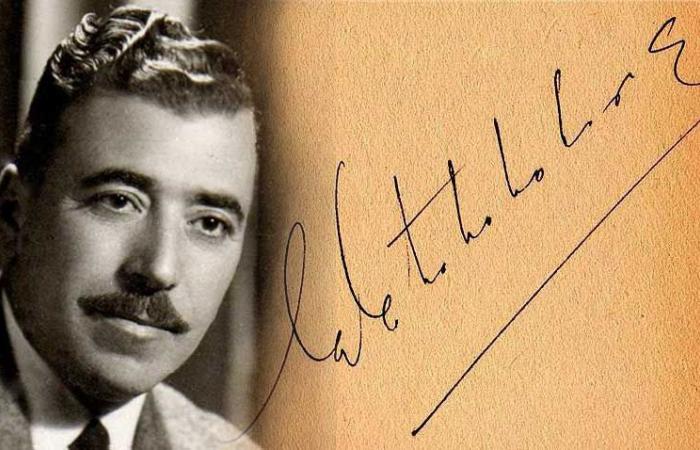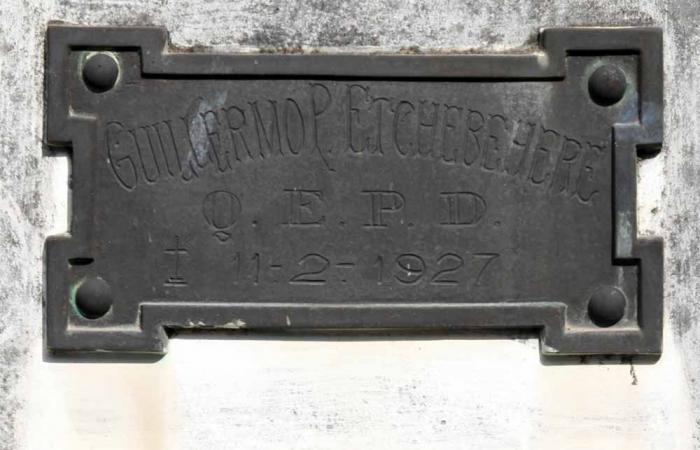Guillermo Etchebeherethe most transcendent poet that the Cañuelas party has produced, was the author Pulse of the Eartha (1940), man’s day (1943), The seed of the wind (1947) and The permanent fire (1956). These four books, along with the transcription of some conferences and poems that were published in literary magazines, appear for the first time together in an anthology.
“Complete Poetry”, The necessary and fair tribute to the Cañuelense poet was an initiative of the cultural ranch The Uncalitos that they share Susana Frasseren and Pablo Garavaglia; from the literary cafe Silence and Voices; and the director of the Sarmiento Library, Juan Manuel Rizzi, responsible for a compilation that required several years of searching.
The printing of 100 copies by Dock Editions is now available in the Library and on the publisher’s platform. The Municipality of Cañuelas collaborated with part of the printing cost and the rest was covered with the contribution of those who made an advance purchase plus anonymous donations. The project promoters are in talks with the National Library to make an official presentation in that area.
Etchebehere was born in Cañuelas on June 18, 1917 in a family of Basque grocers and farmers. He completed his primary studies at School No. 1. His approach to literature occurred in the town’s popular library and through his admired Carlos Vega. At the age of 19, he settled in the city of Buenos Aires to work in Bunge & Born where he would meet the playwright Carlos Gorostiza, your friend and confidant.
Author of a lyrical work that was nourished by the rural landscape and the work of Buenos Aires men, with a militant profile without leaving aside a fine sensitivity, he was a member of the poetic movement called “Generation of the ’40s” and the Lilulí group (name taken from the book of the same name by Romain Rolland).
The cover of the compilation.
The renowned Argentine poet Jorge Calvetti defined Etchebehere as “one of our most real and transcendent values” highlighting its human and literary quality compared to other contemporaries whose works lacked personality. “Many poems deserve to be signed by ghosts, they are so far from life.”
“The heightened lyricism, the attachment to the land and childhood – in Etchebehere not idyllic – It also includes the social, the other as a brother who suffers. Maybe because of this Atahualpa Yupanqui, To whom Etchebehere promisingly gave his book, having barely known it, after the poet’s death he made several of his verses his own, setting three tenths to music in two milongas: “La mano de mi rumor” and “Memoria para el olvido”, included in the album El canto del viento (1980)” highlights Juan Manuel Rizzi in the biographical note that opens the anthology.
“The Basque” died June 2, 1978 victim of an abdominal aortic aneurysm caused by his addiction to tobacco. His remains rest in the municipal cemetery of Cañuelas next to those of his father, William Primitive.
In the prologue, Susana Frasseren He recalls that he came into contact with Etchebehere’s poems in his early adolescence: “I saw the cattle ranches, the crops, the groves, the people working in the fields, the nostalgia of those who immigrated, early death, the endless departure of loved ones, injustice in the world, I heard the birdsong, I felt the aroma and the wind in the eucalyptus trees that named the field that he gave me in profound metaphors.” And he stressed that although part of his work refers to the small town,“his poetry is universal.”
Plaques in the Etchebehere vault, in the municipal cemetery of Cañuelas. InfoCañuelas File.
In Cañuelas, his work remains forgotten, despite the efforts made by the language teachers. Graciela Raffo and Susana Ponce de León from Indavereawho, contrary to the official program, used to include Etchebehere among the poets in their classes, making him a little better known among several generations of students who learned to strip away metaphors with his poem “Pájaros” or were moved by the depth of “Mis abuelos vascos”.
“Complete poetry” It is a new invitation to explore its landscapes.
BIRDS
Noon rides
above the traveling clouds.
Under the green tears
of an old willow tree that dreams,
the fatigue of two oxen
ruminates the thirsty hours.
The birds—the backwaters
nap musicals
they carry the sun in their beak
and on the wings honeysuckle
to decorate with the night
the sackcloth of the stars.
Far away, the sky is tilting
about the thirst of the earth.
Between two rows of pines,
splashing in the ditches
and throwing their voices to the wind
—celestial troop of arrows—
The children run, releasing
flocks of fresh laughter
and searching with his eagerness
and with its deep awake
a soft bed of feathers
for the death of stone.
When the night sowed
blue silence along the paths
the youngest of children,
the smallest smile,
left the round of games
and left with the fireflies
carrying a muffled trill
by the treacherous slings.
Next to a tree with the trunk
devoured by ivy,
made a nest of grasses
for the dead calandria;
and about the frustrated flight
of the two bloody wings
He planted a white poppy
and a silk caress.
The moon found embraced
in a corner of the garden,
the sadness of a death
with the childhood of a poet.
Related Notes
prev
next
slide 9 to 10 of 5
Written by: Germán Hergenrether







